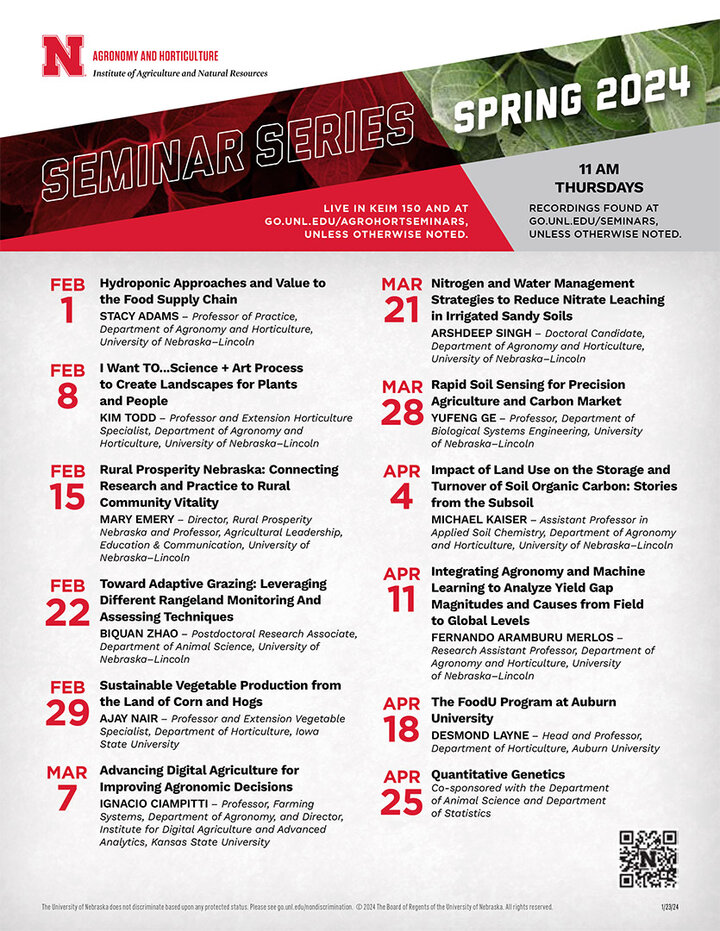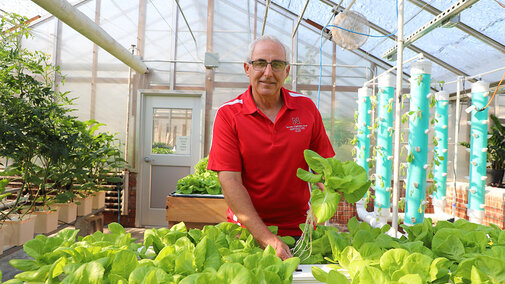The UNL Agronomy and Horticulture seminar series is returning this spring with a new timeslot and a new variety of experts, set to share insights on topics such as rapid soil sensing, precision ag advancements, nitrate leaching, vegetable production, yield gap analysis and soil organic carbon.
The spring series began with “Hydroponic Approaches and Value to the Food Supply Chain,” presented by Stacy Adams, UNL professor of practice in agronomy and horticulture, on Feb. 1.
Adams presented alternative production practices and highlight hydroponic approaches and value within the food supply chain. He discussed how hydroponics may address challenges related to distribution interruptions, environmental influences, socioeconomics, catastrophes and war. His presentation will soon be available to watch online.
All seminars are free and open to the public. Seminars will be in person on Thursdays in Keim Hall, Room 150, and streamed live at 11 a.m. CST/CDT, and recorded unless otherwise noted. Refreshments will be served at 10:30 a.m.
“The seminar committee lines up a program every semester with speakers representing a diverse range of research, teaching and extension topics that reflect the Department of Agronomy and Horticulture’s mission,” Guillermo Balboa, co-chair of the seminar committee, said. “We’re excited to start our spring series, now taking place on Thursdays at 11 a.m.”
This move is a change from the usual Friday afternoon schedule that has been in place for more than 30 years. Based on feedback from seminar attendees, the committee feels this is an advantageous alteration for all who want to attend.
Dates and topics for the rest of the series are as follows:

Feb. 8
“I Want TO...Science + Art Process to Create Landscapes for Plants and People” — Kim Todd, professor and extension horticulture specialist, Department of Agronomy and Horticulture, University of Nebraska–Lincoln
Feb. 15
“Rural Prosperity Nebraska: Connecting Research and Practice to Rural Community Vitality” — Mary Emery, director, Rural Prosperity Nebraska, professor, Agricultural Leadership, Education and Communication, University of Nebraska–Lincoln
Feb. 22
“Toward Adaptive Grazing: Leveraging Different Rangeland Monitoring and Assessing Techniques” — Biquan Zhao, postdoctoral research associate, Department of Animal Science, University of Nebraska–Lincoln
Feb. 29
“Sustainable Vegetable Production from the Land of Corn and Hogs” — Ajay Nair, professor and extension vegetable specialist, Department of Horticulture, Iowa State University
March 7
“Advancing Digital Agriculture for Improving Agronomic Decisions” — Ignacio Ciampitti, professor, Farming Systems, Department of Agronomy, director, Institute for Digital Agriculture and Advanced Analytics, Kansas State University
March 21
“Nitrogen and Water Management Strategies to Reduce Nitrate Leaching in Irrigated Sandy Soils” — Arshdeep Singh, doctoral candidate, Department of Agronomy and Horticulture, University of Nebraska–Lincoln
March 28
“Rapid Soil Sensing for Precision Agriculture and Carbon Market” — Yufeng Ge, professor, Department of Biological Systems Engineering, University of Nebraska–Lincoln
April 4
“Impact of Land Use on the Storage and Turnover of Soil Organic Carbon: Stories from the Subsoil” — Michael Kaiser, assistant professor of applied soil chemistry, Department of Agronomy and Horticulture, University of Nebraska–Lincoln
April 11
“Integrating Agronomy and Machine Learning to Analyze Yield Gap Magnitudes and Causes from Field to Global Levels” — Fernando Aramburu Merlos, research assistant professor, Department of Agronomy and Horticulture, University of Nebraska–Lincoln
April 18
“The FoodU Program at Auburn University” — Desmond Layne, professor and head, Department of Horticulture, Auburn University
April 25
“Quantitative Genetics” — Co-sponsored with the Department of Animal Science and the Department of Statistics, University of Nebraska–Lincoln
For questions, contact Tamara Sukhova, Agronomy and Horticulture Seminar Committee, Guillermo Balboa or Nevin Lawrence, co-chairs, Agronomy and Horticulture Seminar Committee.

